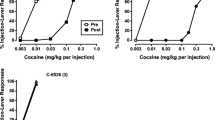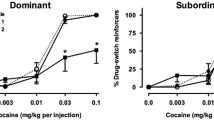Abstract
δ9-THC in doses of 0.25, 0.5 or 1.0 mg/kg was administered to pairs of squirrel monkeys in a water competition test. After stable baseline measures for the pairs were obtained, repeated testing of pairs followed the sequence of orally treating the dominant member, the submissive member, and both members of the pairs. Total competition behaviors decreased when both members received 1 mg/kg, but increased when either the submissive member or both members of low competitive pairs received 0.25 mg/kg. Noncompetitive social behaviors increased when both animals were drugged, an effect which was maximal at 1.0 mg/kg. δ 9-THC produced the most salient effects when both animals were drugged and demonstrated a biphasic dose effect on competition.
Similar content being viewed by others
References
Carder, B., Olson, J.: Marihuana and shock induced aggression in rats. Physiol Behav. 8, 599–602 (1972)
Clark, D. L., Dillon, J. E.: Evaluation of the water incentive method of dominance determination in squirrel monkeys. Folia primat, (in press) (1973)
Ferraro, D. P.: Effects of δ 9-trans-tetrahydrocannabinol on simple and complex learned behavior in animals. In: Current Research in Marijuana. M. F. Lewis, Ed., pp. 49–96. New York: Academic Press 1972
Jones, B. C., Clark, D. L.: Mother-infant separation in squirrel monkeys living in a group. Develop. Psychobiol. 6, 259–270 (1973)
Kilbey, M. M., Fritchie, G. E., McLendon, D. M.: Attack behaviour in mice inhibited by δ 9-Tetrahydrocannabinol. Nature (Lond.) 238, 463–465 (1972)
Masur, J., Martz, R. M. W., Bieniek, D., Korte, F.: Influence of (−) δ 9-transtetrahydrocannabinol and mescaline on the behavior of rats submitted to food competition situations. Psychopharmacologia (Berl.) 22, 187–194 (1971)
Masur, J., Karinol, I. G., Palermo, J. N.: Cannabis sativa induces “winning” behavior in previously “loser” rats. J. Pharm. Pharmacol. 24, 262 (1972)
Uyeno, E. T.: Effects of δ 9-tetrahydrocannabinol on the dominance behavior of the rat. Fed. Proc. 32, 187 (1973)
Winer, B. J.: Statistical principles in experimental design, 2nd ed. New York: McGraw-Hill 1971
Author information
Authors and Affiliations
Additional information
The δ 9-THC was provided through the courtesy of the FDA-NIMH psychotomimetic agents advisory committee. We gratefully acknowledge support of this research by NIMH grants MH 11286 and MH 23414-01. We thank Drs. A. Picchioni, M. Wetzel and C. Trafton for reading the manuscript and providing helpful criticism.
Rights and permissions
About this article
Cite this article
Jones, B.C., Clark, D.L., Consroe, P.F. et al. Effects of (−) δ9-trans-tetrahydrocannabinol on social behavior of squirrel monkey dyads in a water competition situation. Psychopharmacologia 37, 37–43 (1974). https://doi.org/10.1007/BF00426681
Received:
Revised:
Issue Date:
DOI: https://doi.org/10.1007/BF00426681




